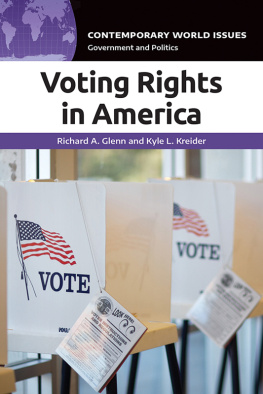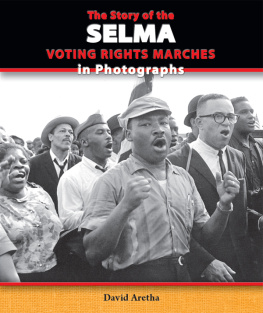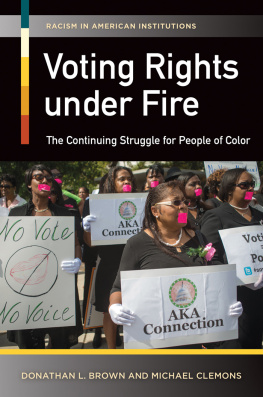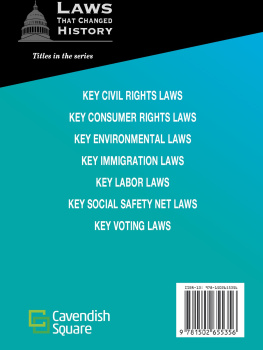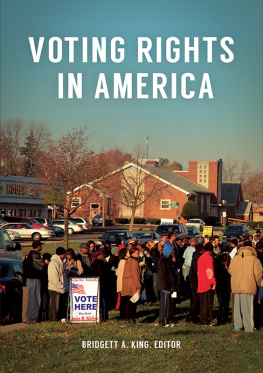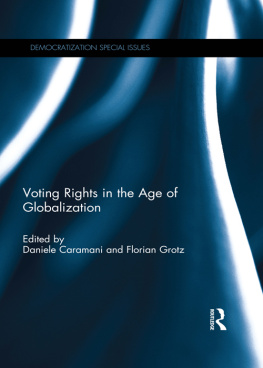Voting Rights in America
Recent Titles in the
CONTEMPORARY WORLD ISSUES
Series
Vegetarianism and Veganism: A Reference Handbook
David E. Newton
The American Congress: A Reference Handbook
Sara L. Hagedorn and Michael C. LeMay
Disability: A Reference Handbook
Michael Rembis
Gender Inequality: A Reference Handbook
David E. Newton
Media, Journalism, and Fake News: A Reference Handbook
Amy M. Damico
Birth Control: A Reference Handbook
David E. Newton
Bullying: A Reference Handbook
Jessie Klein
Domestic Violence and Abuse: A Reference Handbook
Laura L. Finley
Torture and Enhanced Interrogation: A Reference Handbook
Christina Ann-Marie DiEdoardo
Racism in America: A Reference Handbook
Steven L. Foy
Waste Management: A Reference Handbook
David E. Newton
Sexual Harassment: A Reference Handbook
Merril D. Smith
The Climate Change Debate: A Reference Handbook
David E. Newton
Books in the Contemporary World Issues series address vital issues in todays society such as genetic engineering, pollution, and biodiversity. Written by professional writers, scholars, and nonacademic experts, these books are authoritative, clearly written, up to date, and objective. They provide a good starting point for research by high school and college students, scholars, and general readers as well as by legislators, businesspeople, activists, and others.
Each book, carefully organized and easy to use, contains an overview of the subject, a detailed chronology, biographical sketches, facts and data and/or documents and other primary source material, a forum of authoritative perspective essays, annotated lists of print and nonprint resources, and an index.
Readers of books in the Contemporary World Issues series will find the information they need in order to have a better understanding of the social, political, environmental, and economic issues facing the world today.
CONTEMPORARY WORLD ISSUES
Voting Rights in America
A REFERENCE HANDBOOK
Richard A. Glenn and Kyle L. Kreider

Copyright 2020 by ABC-CLIO, LLC
All rights reserved. No part of this publication may be reproduced, stored in a retrieval system, or transmitted, in any form or by any means, electronic, mechanical, photocopying, recording, or otherwise, except for the inclusion of brief quotations in a review, without prior permission in writing from the publisher.
Library of Congress Cataloging-in-Publication Data
Names: Glenn, Richard A., author. | Kreider, Kyle L., author.
Title: Voting rights in America : a reference handbook / Richard A. Glenn and Kyle L. Kreider.
Description: Santa Barbara : ABC-CLIO, [2020] | Series: Contemporary world issues | Includes bibliographical references and index.
Identifiers: LCCN 2020020765 (print) | LCCN 2020020766 (ebook) | ISBN 9781440870927 (hardcover) | ISBN 9781440870934 (ebook)
Subjects: LCSH: SuffrageUnited StatesHistory.
Classification: LCC JF831 .G54 2020 (print) | LCC JF831 (ebook) | DDC 324.6/20973dc23
LC record available at https://lccn.loc.gov/2020020765
LC ebook record available at https://lccn.loc.gov/2020020766
ISBN: 978-1-4408-7092-7 (print)
978-1-4408-7093-4 (ebook)
24 23 22 21 201 2 3 4 5
This book is also available as an eBook.
ABC-CLIO
An Imprint of ABC-CLIO, LLC
ABC-CLIO, LLC
147 Castilian Drive
Santa Barbara, California 93117
www.abc-clio.com
This book is printed on acid-free paper 
Manufactured in the United States of America
In memory of my father, C. Kenneth Glenn (19342010),
in honor of my mother, Beth B. Glenn,
and, as always,
for my wife, Lorena, and my sons, Ryan and Andrew
RAG
To my wife, Susanne, and my children, Kathryn and Ben
KLK
Contents
Representative government is a fundamental principle of the American political system. Without free, fair, and regularly scheduled electionsin which people select those who govern themrepresentative government is not possible. The right to vote is the ability to confer, withhold, or withdraw consent by casting votes in elections where representatives are chosen and to have those votes properly counted; it is essential to democratic governance.
The principles of representative government and popular consent have deep roots in the American experience. In the 1760s, no taxation without representation was the political cry of the thirteen colonies in expressing their grievances against the Crown and English Parliament. A decade later, the Declaration of Independence famously declared, Governments are instituted among Men, deriving their just powers from the consent of the governed. In the Gettysburg Address, President Abraham Lincoln talked about government of the people, by the people, and for the people. In 1873, Susan B. Anthony, criticizing laws that prohibited women from voting, noted, To [women], this government has no just powers derived from the consent of the governed. Representative government was the motivation for Martin Luther King Jr.s Give us the Ballot speech in 1957. These principles have even been offered as justification for war, numerous presidents having sent soldiers to foreign countries to rid those countries of autocratic leaders and restore control to the people.
All government is in the free consent of the people is a powerful idea. And it is not achievable without elections and the right to vote, the crucial mechanisms by which the people determine who will govern. Elections thus bestow upon government a legitimacy that is otherwise unattainable.
Elections in the United States are seemingly ever-present, the sheer number and frequency often mindboggling to all but the most active political participants. Because the United States employs a federal structure, elections occur at three separate levelsnational, state, and local. No year passes without some election, and most years have elections at all levels.
Congressional elections occur on the Tuesday following the first Monday in November in even-numbered years. Terms in the House of Representatives are only two years in length; as such, there are 435 House elections alone every other year. In the Senate, terms are six years in length, so roughly thirty-three Senate elections happen every other year. Presidential elections are conducted every four years, but always on the same day as congressional elections.
Elections for state and local offices are even more numerous. Every year, voters cast ballots for governors, state legislators, state judges, and a host of local candidatescounty commissioners, mayors, city councilmembers, district attorneys, sheriffs, fire wardens, coroners, prothonotaries, registers of wills, judges, court clerks, justices of the peace, and so forth. (Even the modern-day political insult, You could not be elected dogcatcher, rings somewhat hollow. At least up until the middle of the twentieth century, dogcatcher was an elected position in many small jurisdictions. As recently as 2018, voters in Duxbury, Vermont, reelected Zeb Towne dogcatcher, the only remaining elected dogcatcher in the country. Later that year, however, a lawyer for the Vermont League of Cities and Towns informed Duxbury that dogcatcher was not an official elected position under Vermont law. Towne was then appointed to the post; the vote was unanimous.)

